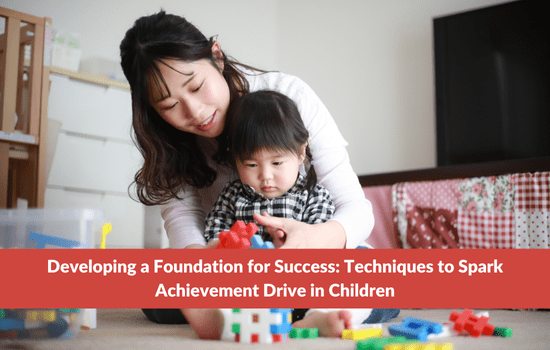As parents, educators, and caregivers, one of our greatest aspirations is to see the children in our lives flourish and succeed. In today’s fast-paced world, developing a strong foundation for success begins with fostering a growth mindset, cultivating self-efficacy, and encouraging intrinsic motivation. These key traits empower children to believe in their abilities and approach challenges as opportunities to learn and grow. By nurturing perseverance and guiding them through intentional goal-setting, we can equip children with the essential tools and mindset they need to navigate life’s challenges and pursue their dreams with confidence, determination, and resilience.
Simple Ways to Instill Achievement Drive in Children

Central to this journey is the cultivation of achievement drive – that inner fire that propels individuals to set goals, overcome obstacles, and strive for excellence in all they do. Fortunately, nurturing this drive doesn't require elaborate schemes or expensive resources. Simple, everyday actions and attitudes can have a profound impact on a child's development.
Why Ingraining Achievement Drive in Children is Important
By fostering achievement drive, children learn to set goals, face challenges, and develop a strong sense of self-efficacy. Research has shown that self-efficacy beliefs strongly influence motivation, resilience, and academic performance (e.g. Bandura's foundational work; see Self-Efficacy as a Positive Youth Development Construct). (Source: National Library of Medicine)
Similarly, more recent research has linked a growth mindset to improved well-being and motivational outcomes. For instance, a 2024 Frontiers in Psychology study found that a growth mindset positively predicted students' subjective well-being, which was mediated by achievement motivation and grit (i.e., perseverance) in high school students.
Establishing achievement drive in children is crucial for several reasons:
-
Achievement drive motivates children to pursue goal-setting and instills a sense of purpose and determination to excel.
-
Encouraging children to strive helps them develop perseverance in facing challenges and setbacks.
-
Success, whether big or small, boosts children's self-efficacy and self-esteem.
-
Teaching children the importance of intrinsic motivation—finding joy in the process rather than only the outcome—prepares them for lifelong success.
-
Developing a strong work ethic and resilience equips them for the complexities of school, careers, and relationships.
What Is Achievement Drive?
We know not everyone is naturally endowed with a high achievement drive. As parents and caregivers, our goal is to prepare our children for success in life. Considering the correlation between success and achievement drive, we must help develop these skills in our children.
According to psychological theory, the "need for achievement" (N-Ach) refers to an individual's desire for significant accomplishment, mastery of skills, control, or high standards. A child's drive is strengthened when they develop self-efficacy, receive meaningful feedback, and experience achievement linked to effort rather than luck.
Foundations of high-achievement drive include:
-
Encouraging independence in childhood (so children see themselves as agents of change).
-
Framing praise and rewards around effort, strategy, and persistence.
-
Helping them link achievements to competence and hard work (not fixed traits).
-
Cultivating a growth mindset, with repeated exposure to challenge and reflection.
Fostering A High Achievement Drive In Children
Many parents genuinely want the best for their children and often fill gaps from their own upbringing. The pitfall, however, is that overdoing things for them can quash their emerging intrinsic motivation and ability to self-regulate. Praise that is indiscriminate or focuses only on showing up can give a misleading sense of accomplishment.
Suggestions To Enhance Achievement Drive In Children
Here are a few recommendations for enhancing children's achievement drive early on. Parents who practice these suggestions and model emotional intelligence skills and strategies will allow children to live fulfilled and successful lives.
-
Begin fostering independence between the ages of six and eight, allowing them to experience safe autonomy.
-
Encourage choice-making even in early childhood (e.g., let toddlers pick among two snack options).
-
Invite them to care for their personal space (rooms, toys), nurturing a sense of ownership and responsibility.
-
Teach goal-setting skills by having them break a larger goal into smaller steps, track their progress, and reflect on the outcomes.
-
Model perseverance by letting them see how you respond when things go wrong—telling the story of a tough moment and how you recovered is powerful.
-
Reinforce self-efficacy by pointing out that mistakes are part of learning, and that they have succeeded at similar challenges before.
-
Use feedback that emphasizes strategy ("You tried a new approach") and effort ("You kept at it") over general praise.
Parents And Caregivers, Avoid These Mistakes!
There's a fine line between raising the bar and setting it so high it becomes paralyzing, or conversely, expecting too little, which undermines growth. Over-protecting, doing tasks for children, or praising only participation without effort can foster dependency and erode self-efficacy. Instead, allow them to struggle (within safe bounds), reflect on what works and what doesn't, and celebrate small wins—even if imperfect.
We've explored impactful yet straightforward ways to cultivate achievement drive in children, including fostering intrinsic motivation, modelling a growth mindset, reinforcing self-efficacy, encouraging perseverance, and teaching goal-setting systematically. These building blocks create a durable foundation for lifelong learning, confidence, and success. By gently guiding, challenging, and believing in your child, parents and caregivers offer one of the most meaningful gifts possible. For readers interested in exploring emotional development and mindset further, consider the chapter "Raising Emotionally Intelligent Children" in my book, The Power of Emotion.
This article was originally published on August 5, 2017, and has been updated (October 2025).
More Motivational Reads Here »
How Emotionally Intelligent Are You?
Sign up for Linda's monthly tips to build your Emotional Intelligence and reduce Emotional Hijacking!

















